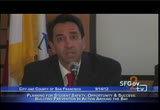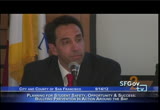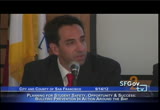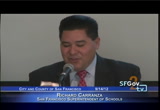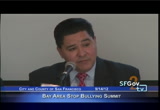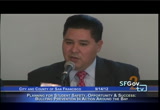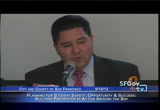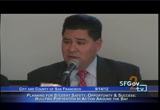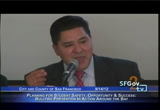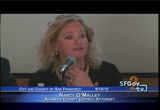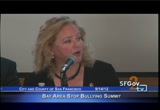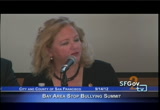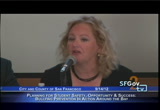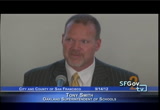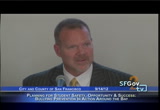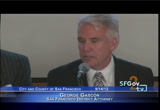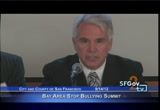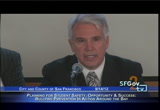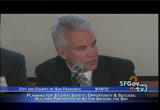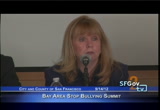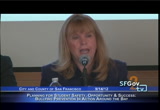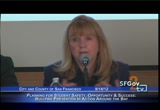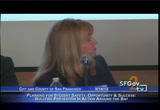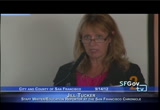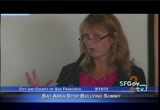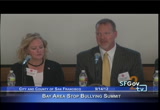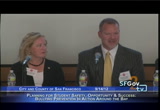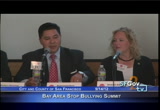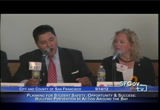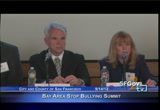tv [untitled] February 13, 2013 1:30am-2:00am PST
1:30 am
prosecutor's office, in a police department, it's arresting. it's putting in jail. it's going in court and find this person guilty and punish them. that's a kind of hard power and most of what is done in a prosecutor's office -- most of the resources are devoted to those hard power tasks, but although we devote less resources to soft power there are probably more important and soft power is where you change the hearts and minds of people. where you try to change cultures, try to change the norms in the community are and certainly in our office we devote significant resources to this. just a couple of examples. we have something called the parent project, and i am very grateful in a time of really reduced funding our board of supervisors stepped up and provided funding for otherwise what was run on a
1:31 am
shoe string out of our office, and it's a program that teaches parents to be better parents and parents get referred this program through schools, through police department, through their churches and some of the behavior that we see in schools are behavior they are learning at home, so we try to address this through this project. we offer it all over santa clara county and in english and spanish and vietnamese and that is one example of what we do. a second initiative we are working to make happen is something called "school link services" where there's all of these different resources floating out there to help children, to help young people, but often it's not centralized in the school and so it involves a lot of cooperation and collaboration between all different county agencies and we're sphere heading that, so those are some of the efforts
1:32 am
we have taken in our office, and again from a perspective of the prosecutor and it really offends our sensibility for someone to be taking advantage of to be harmed or abused and we want there to be justice for that victim and we want that offender to change their ways and we want that the climate and culture in which the bullying takes place begins to change and it's not acceptable so we use a combination of hard power and soft power. >> jeff thank you. [applause] two to three minutes goes really fast and that was a little over, just fyi. superintendent. >> don't start the clock yet. thanks. again i want to thank everyone for being here this morning and this morning i said "welcome to a sunny day in september" and many of you
1:33 am
didn't believe me and i want to thank you all for being here and in my comments at the beginning i spoke of the wonderful experience and having 3,000 opportunities yesterday see "bully" the movie. i spoke of all of the administrators seeing "bully" when they came back from summer break and develop their plans on their campuses here, so i would like to go deeper and talk about a couple of things and before that i appreciate what rosylyn and the previous panel said about the term "bullying" and run the risk of it meaning something generic and meaningless and the word of the day, so let's talk about what it is. it's assault. sometimes it's aggravated assault. it's kidnapping. it's coercion of human rights. it's
1:34 am
stalking. these are different pictures when you think about it in those terms. that's what bullying is so in san francisco unified we say we have a zero tolerance for bullying or any kind of activity like bullying i want to decouple zero tolerance from the notion of having punitive measures because we don't believe in that. we mean that every classroom, every school environment should be a safe environment where everyone is welcomed regardless of who you are, regardless of your ethnic background, sexual orientation or cultural background and we don't couple that with behaviors that kids will display. and the other thing in terms of context that i want to make sure is clear and i didn't am happy you're here and we are fighting a battle against pop culture and the messages
1:35 am
they receive on tv, logging on to the facebook page, logging on to all of the social media that is out there, think how many times in pop culture they refer to someone as "their little b, or little n" and that's just the way we greet each other and for someone that entered school only speaking spanish and you think about the language issues and in spanish i can tell you a whole bunch of terms that people use to great each other that are so racist, homo phobic and have a length and accepted as accepted and we need to work together and we're dealing with a culture we are trying to shift and in san francisco we are proud of the work around the issue of tolerance but we look at it as prevention. we don't want to be responding to issues once they happen so we work
1:36 am
very hard to build relationships that are truly centered around individuality in the schools so to be proactive we build these strong communities. we have conversations about our communities. our balance score cards at every one of our schools developed and revises every year has a component talking about a safety healthy community in it. we talk about fair processes. we talk about having conversations in circles so no one is ahead of the conversation, so we all have equal standing those conversations. our behavioral guidelines at schools have in are based on this notion of equity and equality and this notion we're going to treat efer everyone fairly and jill mentioned my former title and superintendent of social
1:37 am
justice and people say "that's san francisco" and we believe that a right to a education is i social justice issue and if you deny that you're denying their civil rights. that's how we feel about being proactive. now there is a line of demarcation happens and we want to be proactive i know jill is looking at me. when the event happens and there is harm that occurs we believe in restorative practices and repairing the harm. we don't believe in kicks kids out of school. that's not a solution. we are an educational institution. we go through this process and the perpetrator understands the damage and make it right to the victim. it's not okay shake hands. it's a whole process. you talk about it and process what is happening and people follow up on that,
1:38 am
so we very much believe in this restorative process in san francisco and how do we know? because of the indicators that should be going up are going up and the others are going down. our truancies are down. suspensions are down and students in class is going up. thank you for being here. [applause] >> okay. that's okay. you jumped ahead to several of my questions so you don't get to talk anymore. for the rest of the four panellests whoever keep its to two to three minutes gets a prize. nancy. >> good afternoon and thank you for paying close attention to this issue and thank the staff and anne marie conroy for putting this together and us part of it and i will acknowledge theresa who works on my staff as chronic absteism
1:39 am
and involved with the oakland school district and i partner with tony smith and this man brought innovation to the oakland school district which has a lot of challenges which he may go into. i won't. so i really echo what jeff said about soft or hard power but let me tell you from my standpoint. i have a nephew who was in school and was bullied and there were sexual overtones to it and the result is he left the school and i spent time working with the school and my district and it wasn't my area and educate them about what bullying meant and in the most heinous way described to them and it went no where and that gave me the lesson in life we have children that are in fear when they go to school so
1:40 am
they don't go and my priority is to have safe schools and they can be educated and create their path to a successful future and it's a healthy environment and bullying prevents that for so many kids. when terreesa and i addressed issues around truancies and one of the common themes and i saw this before with sexually exploited cases and kids were afraid to go to school because of the terrorism going on and with bullying it's flat out terrorism for the victim and the recipient of it. our efforts are strong because we don't want kids to feel that the only choice is don't go to school or find a new school to go to and also gave us the opportunity to look at the children that are bullied and what is going on in their house
1:41 am
or family and why are they acting out to an aggressive, mean way? and it opened up a lot of doors for us and our initiative is take this head on to make sure children feel safe and they are safe and our challenge is the introduction of the internet and social media and can be so insidious behind closed doors. the governor signed a bill into law and my office and the l.a. county sheriff have committed to keeping track and data of crimes that occur involving the internet or social media because we frankly don't have good data around that, particularly involved with crime so for the next couple of years we do will a lot of data collection and working with law enforcement and they're doing it and address this problem from evidence and outcome based area. thank you. >> thank you. >> no name other than more work
1:42 am
for nance's staff. -- >> what we do in oakland -- i don't think bullying is more than a school issue. this is bully center thed. there is a way the violence perm mates across the board and i strongly believe that schools are the heart of health and community well being and the way we're going to transform this world is coming around our kids. we have a sacred obligation and kids to be safe and well connected and well known is all of us, all of us, all the time and even in the room today and the pretense and around the punter -- the
1:43 am
question is if it came from the punter and the nfl and the hierarchy and ranking and all the time we're making judgments even as adults. those are embedded in the school experience and how we engage each other in different ways and to say this place in school is a way of increasing our empathy that we would in fact keep our worth's intact while the others is intact and the highest inspiration and live that in stated value and change the practices around social emotional learning and embed in the city of oakland that we belong to each other and i tell you what when so many of the students have been murdered over the last three and a half years i have been there and up to 85 homicides in the city this year it is a place and space of despair and lack of hope. i
1:44 am
have tremendous respect for our law enforce .. we have been doing restorative justice work with the police department and with the teachers. people are saying enough is enough and i have in fact have to change to seek transformation. i mean we have to -- the saying cornell west that justice is the public face of love. if in fact we want that to be true we have to be just with one another and i think that's what we're trying to do in oakland. [applause] >> district attorney. >> well first of all i would like to thank you for putting this together. i also want to thank katie miller and rebecca from my office and consistently at the forefront and in the community and common sense media who became a partner last year and katie and her people and
1:45 am
rebecca and the school district we started public information a year ago and my partner richard carranza who is an incredible superintendent, someone i am proud to work with. first of all let me tell you that bullying takes many different shapes. it can be physical, it can be emotional, it can be verbal. i can tell you having been a non english speaking student and immigrant early on and quite frankly times that were very different that we were bullied all the time and didn't know it was bullying and right to the point i actually dropped out of school, and i think it's also important to recognize it's not kids on kids and sometimes adults are part of it, and sometimes unfortunately staff members are part of it. i remember being accused early on by a science teacher and told i
1:46 am
was using lsd and i didn't know what it was at the time. i was in the class for three months and didn't work english and the teacher didn't realize i didn't speak english and there was only 20 in the classroom and bullying can take different shapes and not paying attention and caring and while we're focusing on what kids are doing to each other, we must not ignore that sometimes adults can be part of the problem just by their behavior, even by the way they look the other way. i agree with richard 100% that we need to deal with this but zero tolerance has to be articulated in a very different way. 36% of kids that are bullied everyday report not coming to school. there is another piece that is important. as a member of the justice center we did intensive study
1:47 am
of school discipline last year and looked at a million roashds and 60% that are disciplined incredibly more likely to drop out of school and end up in the criminal justice system and while we are working with the victims and educating we are working with all of the kids and we want the kids to have a healthy environment when they're in school, and not only when in school but as they become a citizen and progress through their life. i am proud to being here. our office is very committed to doing this and fortunate and we got a couple of grants announced and working on restorative justice with the schools and did it with adults and this is a wonderful opportunity. thank you very much for putting this together. [applause] >> thank you. cheryl. >> great thank you. it's wonderful to be here today. i
1:48 am
am actually wearing two hats. one i am representing for our area we have an anti-bullying campaign we launched, a two year program through the superintendent of the schools in san mateo county and also as the director of community gate paths and serves children and adults with disabilities and how i got involved with this two years ago we have a website, online social networking cite site that a lot of parents participate in to get information and professionals and networking and sharing stories with each other and two years ago in the fall we heard parents complaining about kids with special needs and the bullying going on in the schools and the lack of response from the schools to the issues. there was starting to concerns about facebook and cyber
1:49 am
bullying so we were going to put together basically a paper. that paper turned out to be a report. walk a mile in their shoes through the stories we heard across the nation what were just gut wrenching with kids with special needs and the crutches were knocked out from under them and one girl tried to jump out a window to get away from the group bullying her. one of the kids and drinks spiked with alcohol everyday at school up to the point he was hospitalized and almost died and poisoning to another child that was forced to eat dog food on the play ground during lunchtime, so these horrible stories. we put together the report and started really giving a voice to children who had been bullied as well as their families and this was an area that wasn't really talked b as a result of that we were invited
1:50 am
to the federal summit a year ago in washington dc, and i have to tell you after sitting and hearing a day of stories of all of our children i came away with just something in my stomach that just couldn't let it go. that, this was something that ready had to be addressed and this what was i was going to focus on. at the time we were trying to pursue some federal legislation to protect children with special needs. that wasn't going anywhere. as i heard in the federal summit and heard the issues around the definition of bullying, concerns about policies and procedures, seemed like a lot of people blaming everyone. parents blaming schools and schools blaming parents. there seemed to be a lot of confusion and noise out there and i will never forget
1:51 am
at the last session secretary duncan got up and said "this issue is really a very complex issue, and the only way it's going to get addressed is back in your community". well, i took that to heart because i realized that's what needed to be done, and that's why i came back to san mateo county and have gathered other like minded people and what we can do over the next two years and address this issue and put in place the measures that need to be done to make our environment safe because we know that bullying doesn't just happen in the schools. it happens all throughout our community. >> thank you. [applause] >> i get a lot of emails and press releases and it was interesting yesterday morning i
1:52 am
went and saw the movie "bully" with the kids in san francisco and over the course of the rest of the day i got and maybe a few days before that at least three emails, press releases, with adults accusing each other of being a bully. in one case it was folks accusing a superintendent of being a bully for imposing budget cuts. another one it was a principal who was a bully because she was tough on teachers at the school. i hear politicians calling each other bullies on the campaign trail. when i watched the film yesterday it broke my heart that alex who was completely experiencing what a bully really felt like to have these people throwing this word around
1:53 am
lightly, politically, for press attention. and i want to go back and talk about bullying. i think people addressed it in their minds what bullying is, but i want to ask you what is bullying? how did that differ or where is it on the spectrum of behavioral issues? is there a point where you say this is bullying? and when do you step in and take action for what would be bullying or what is just a classroom management issue or behavioral issue? i would like to see if you could differentiate just a little bit about when you see intervention most effective for this thing that alex called bullying?
1:54 am
>> as mandated reporters for sexual abuse but where is the mandated reporting for this type of abuse and stand for it and call out? i think the notion of the restorative frame and it's a reporture of a relationship and until such time we start talking about caring school communities and any of the ded greidation of other is limiting is a power differential and damaging the other we haven't taken on the notion of bullying in the way we need to and growing the social emotional well being of the young adults and quite frankly adults are -- we all know are totally compliitd and sometimes
1:55 am
just afraid and don't know how to intervene and know enough so we have taken more time and are going to take more time to increase the capacity of the adults and to differentiate and feel more comfortable and i will tell you across race, across class -- maybe that's the way they do it. as an educator, can i? and as a responsibility we have to get power and empowering adults what they can do and the responsibilities are and to name discrete actions and this is bullying and this isn't and it's a much bigger frame about children and adults being safe and being fully present and we're are taking that on as a system and until that time we have done that i don't think we're going to see the real outcomes that we need that are focused ready to engage in communities the way that we need to. i can't give you this is bullying. this isn't. we're
1:56 am
making progress in able to talk about it. >> richard. >> i agree everything tony said and as a teacher and administrator and i have children in the san francisco public schools to and this is about the power relationship that one individual has over another individual and the district attorney spoke about sometimes adults are part of the issue where an adult that holds the ability to give you a grade for example and you're a senior and you need a certain grade to get into a certain college that is inhere endly a power relationship, and to utilize that relationship to get certain actions out of a student or hold certain students accountable i think is what tony is talking about. it's not a healthy relationship and it's issues of power and about relationships. how do you develop relationships that are
1:57 am
respectful? it reminds of the term "social justice". we think we know what we mean by it but i can't tell you the emails i get from individuals. >> if "if you don't get me in the school i want to you're denying me social justice" and it's usurping of the teerm and let's call bullying what it is and assault and make it clear to what it is and make it clear to other individuals and there are other grades and issues of classroom management and it's okay and let's get focused and ready to go on the lesson, but when you're talking about hurting somebody's feelings that is often times in my experience been an issue of power. >> yeah, i would like to add to that. i think there has been dialogue in the nation
1:58 am
throughout the issue in the last year, and when you look at recent report that the federal department of education presented basically has the definition of bullying in every single state and also a list of i think 37 components and ranks that show you state by state which ones include those components of it. as we heard earlier the federal department is close to approving a federal definition of bullying, so i do believe there is a lot of work in this area. i also think there is a lot of work going on in terms of evidence based practices in terms of interventions that is very exciting. some of the information that we know is that about 80% of the bullying that goes on can pretty much be handled by some very prescribed ways of dealing with things.
1:59 am
20% requires really very targeted social emotional behavioral approach and i think that as we get better at that knowing what methods work with which kids we're going to come a long ways in terms of the interventions and then being successful with those. >> thank you. >> a lot of folks talked about the culture of a school and improving the culture of a school. when i was doing background research on bullying one thing that came to mind was sort of the differences in different cultures which could be in two different schools in the same city about who the victims of bullying might be and the hot shots in each of the schools, so for example research showed that the social attitudes within a particular setting d
64 Views
IN COLLECTIONS
SFGTV2: San Francisco Government Television Television Archive
Television Archive  Television Archive News Search Service
Television Archive News Search Service 
Uploaded by TV Archive on

 Live Music Archive
Live Music Archive Librivox Free Audio
Librivox Free Audio Metropolitan Museum
Metropolitan Museum Cleveland Museum of Art
Cleveland Museum of Art Internet Arcade
Internet Arcade Console Living Room
Console Living Room Books to Borrow
Books to Borrow Open Library
Open Library TV News
TV News Understanding 9/11
Understanding 9/11